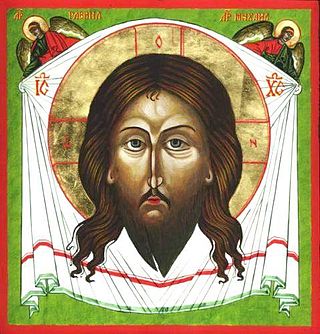Top Qs
Timeline
Chat
Perspective
944
Calendar year From Wikipedia, the free encyclopedia
Remove ads
Year 944 (CMXLIV) was a leap year starting on Monday of the Julian calendar.

Remove ads
Events
By place
Byzantine Empire
- Arab–Byzantine War: Byzantine forces are defeated by Sayf al-Dawla. He captures the city of Aleppo, and extends his control over the Al-Jazira–Upper Mesopotamia region. Al-Dawla's rule is recognized by the Ikhshidids.[1] With the recovery of Edessa, the Greeks also obtain the fabled Image of Edessa.
- August 15 – The "Holy Mandylion" (a cloth with the face of Jesus) is conveyed to Constantinople, where it arrives on the feast of the Dormition of the Theotokos. A triumphal entry is staged for the relic in the capital.
- December 16 – Emperor Romanos I is arrested and deposed after a 14-year reign by his own sons, the co-emperors Stephen and Constantine. He is carried off to the Prince Islands and forced to become a monk.
Europe
- King Hugh of Provence dispatches an embassy to King Otto I of the East Frankish Kingdom, offering a large sum of cash if he promises not to provide assistance to Berengar of Ivrea. Otto refuses this offer.
- Raymond III (or Pons I), count of Toulouse, travels to Nevers (southeast of Paris) to declare his fidelity to king Louis IV ("d'Outremer"). He is granted the title 'prince of the Aquitanians' by the king.[2]
- The largest recorded epidemic of ergotism, also known as "Saint Anthony's Fire, kills 40,000 people in France.[3]
England
- King Edmund I regains (with the help of Danish settlers) the territory he ceded to Olaf Guthfrithson. He conquers Northumbria and cedes Cumberland to Malcolm I, king of the 'Picts and Scots'.
- A great storm sweeps across Wessex and many houses are destroyed, 1,500 in London alone (a significant proportion of the town).[4]
Africa
- Abu Yazid, a Kharijite Berber leader, launches a rebellion in the Aurès Mountains (modern Algeria) against the Fatamids, seeking aid from the Caliphate of Córdoba in Al-Andalus.
- The cities of Algiers and Miliana are re-founded by the Zirid ruler (emir) Buluggin ibn Ziri.
Asia
- In Tĩnh Hải quân, after the demise of Ngô Quyền, Dương Tam Kha forced Ngô Xương Ngập, Kha's nephew-in-law, to abdicate and installed himself as king, calling himself Dương Bình Vương (King Ping of Yang).[5]
By topic
Religion
- The Al-Askari Mosque is built in Samarra (modern Iraq).
Remove ads
Births
- Abd al-Malik I, Samanid emir (d. 961)
- Al-Mu'ayyad Ahmad, Muslim imam (d. 1020)
- Fujiwara no Akimitsu, Japanese bureaucrat (d. 1021)
- Fujiwara no Sukemasa, Japanese statesman (d. 998)
- Ibn Juljul, Muslim physician (approximate date)
- John VIII bar Abdoun, patriarch of Antioch (d. 1033)
- Otto (or Odo), duke of Burgundy (d. 965)
Deaths
- February 25 – Lin Ding, Chinese official and chancellor
- April 8 – Wang Yanxi, emperor of Min (Ten Kingdoms)
- April 23 – Wichmann the Elder, Frankish nobleman
- Abu Mansur al-Maturidi, Muslim theologian (b. 853)
- Abu Tahir al-Jannabi, Qarmatian ruler (b. 906)
- Ch'oe Ŏn-wi, Korean minister and calligrapher (b. 868)
- Donnchad Donn, High King of Ireland
- Flaithbertach mac Inmainén, Irish abbot
- Mahipala I, Gurjara-Pratihara king
- Liu Hongchang, Chinese chancellor
- Fang Gao, Chinese official and chief of staff
- Li, empress of Min (Ten Kingdoms)
- Wang Yacheng, Chinese prince
- Duan Siping, ruler of Dali (approximate date)
- Ngo Quyen, Vietnamese king
- Harshavarman II, Angkorian king
References
Wikiwand - on
Seamless Wikipedia browsing. On steroids.
Remove ads
